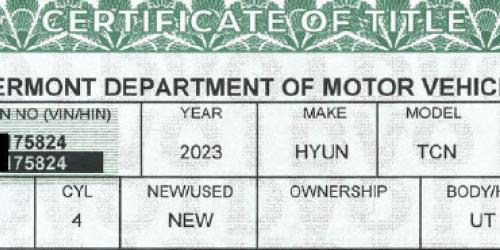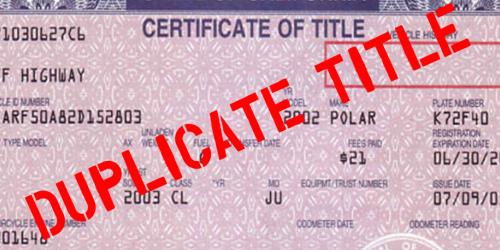Only a Vermont resident can obtain a Vermont Bonded Title.
You must make every reasonable attempt to obtain the previous title issued to the vehicle, trailer, vessel, snowmobile, or all-terrain vehicle. You may apply for a bonded title if you are a Vermont Resident and have exhausted all other options to obtain the title.
You must prove that you have reasonably attempted to acquire the previous title from the previous owner, state DMV, or lien holder. If you show by letters from the issuing state that the title, or a replacement, is unavailable, the department will consider an application for the “title on bond.”
What is a Bonded Title?
Bonded Titles, Certificate of Title Bonds, or just Title Bonds are a type of surety bond. Surety bonds are a type of financial guarantee between three parties. These are known as the principal (the party that is required to obtain a bond), the obligee (the party that requires that the principal obtains the bond), and the surety (usually a surety company that guarantees that the bond obligations are performed).
A Bonded Title is commonly used to demonstrate ownership when the original title is missing or incomplete. In this capacity, they can act as replacement titles. Moreover, they generally transition into full ownership titles after a given period (three years in Vermont).
However, the primary role of a Title Bond is to guarantee that the owner who is required to post a Title Bond is supplying truthful information about the vehicle, trailer, vessel, snowmobile, or all-terrain vehicle in question. If the bondholder misrepresents information about the vehicle, trailer, vessel, snowmobile, or all-terrain vehicle, such as its ownership history, the bond guarantees to protect injured parties with a legitimate claim against the bondholders. These parties might include lienholders or legal previous owners in the event of theft.
Why is a Bonded Title Required?
Vehicle, trailer, vessel, snowmobile, or all-terrain vehicle titles verify that a given vehicle, trailer, vessel, snowmobile, or all-terrain vehicle is bought by a new owner, sold, and owned legally. They contain valuable information such as the make, age, owner’s name, and serial number (VIN/HIN). Without this title, it’s difficult to prove that a given vehicle, trailer, vessel, snowmobile, or all-terrain vehicle is owned legally.
Title surety bonds offer protection to any party that might be hurt by the illegal sale or possession of a vehicle, trailer, vessel, snowmobile, or all-terrain vehicle. As such, there are several circumstances in which a Bonded Title is usually required. These circumstances include:
- When buying a vehicle, trailer, vessel, snowmobile, or all-terrain vehicle without a vehicle title
- When the title lacks important information, such as the name of the current owner
- When the buyer loses the original title before it can be transferred to their name.
Title Brands
A bonded title will have a title brand added to it.
Obtaining a bonded title in Vermont
Per 23 V.S.A. § 2020 & 23 V.S.A. § 3813 Withholding of certificate; bond required
- Your insurance company will complete the Title Bond form (VT-020). Both sides of the form must be completed.
- You must make every reasonable attempt to obtain the previous title issued to the vehicle, trailer, vessel, snowmobile, or all-terrain vehicle. If you show by letters from the issuing State that the title, or a replacement, is unavailable, the department will consider an application for the “title on bond.”
- The value of the bond must be one and one-half times the J. D. Power average trade-in value of the vehicle, trailer, vessel, snowmobile, or all-terrain vehicle being bonded (see “vehicle tax estimator” for the current J. D. Power value).
- Bond must be conditioned to indemnify any prior owner and lienholder and any subsequent purchaser of the vehicle or person acquiring any security interest in it, and their respective successors in interest, against any expense, loss, or damage, including reasonable attorney's fees, by reason of the issuance of the certificate of title of the vehicle or on account of any defect in or undisclosed security interest upon the right, title, and interest of the applicant in and to the vehicle.
- The bond application will be rejected if the completed form contains any erasures, alterations, or strikeouts.
- The completed bond form must be returned to the Department of Motor Vehicles with the following documents:
- Vermont Registration, Tax, and Title Form completed,
- Verification of VIN (VT-010) completed,
- Ownership documentation such as bill of sale, old registration certificates, or the title itself, and,
- Fees due for registration, tax, and title.
The department will review the completed bond form and your reason for needing a bond. If your request is rejected, you will be notified in writing as to the reason the bond was found to be unacceptable.



